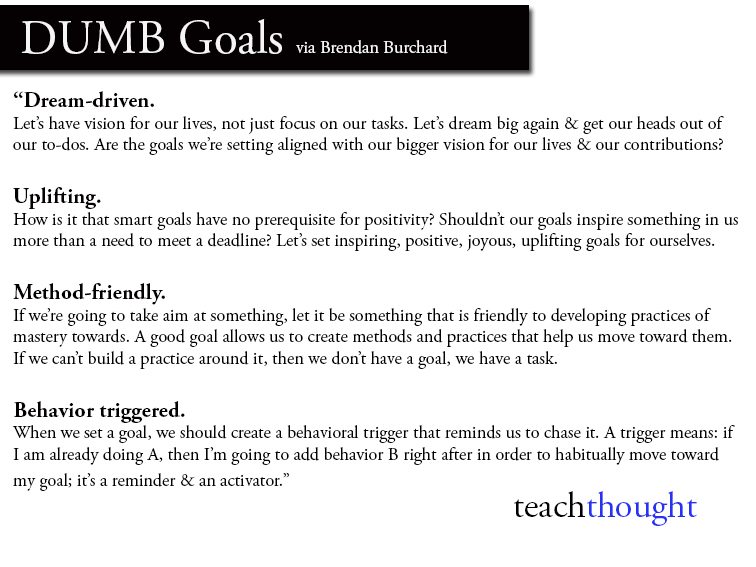Is It Time For Dumb Goals In Education?
by Terry Heick
I’ve always liked SMART goals.
Specific, Measurable, Attainable, Realistic, and Time-Bound. This idea, along with the potential of collaboration in almost any circumstance, is one of the good things I took from my work with the forced-collab data teams and professional learning communities. The idea of taking a goal and packaging it so that a kind of pathway can emerge towards making it happen. Pretty neat.
See also 5 Strategies For Setting SMART Goals In The Classroom
When I work with schools and districts, goal-setting almost ways comes up, and a conversation around SMART goals soon follows. They universally adored–who could argue against being specific what we’re trying to do?
And then I saw this video, and now I’m not sure.

Normally, motivational speakers make me want to kick myself in the face. To me, their “strategies” and “triggers” feel plastic and strange, and their bulging eyes and staccato, Starbucks-fueled cadence and bleached white teeth frighten me. But this video, by motivational speaker Brendan Burchard, has a point about the loss of imagination in our drive to make things manageable.
In education, we take an inherently human, creative, and messy process and try to make it efficient, productive, and predictable.
We have no interest in letting–we cause.
We aren’t interested in wisdom–we insist on content mastery.
Helping students to think critically and carefully isn’t our priority.
Imagine the ambition–the hubris–of cataloging the known-universe into a half-dozen “content areas.” That’s pretty crazy. This reductive approach extends to the industrialized practices of grouping, scheduling, and packaging of students, curriculum, and performance.
This is all done not out of churlish spirit, but left-brain mechanics–science, data, diagnoses, assessment, proficiency, recovery, remediation, and other jargon we use to separate ourselves from the tiring, perfect chaos of teaching and learning. But as Burchard explains (and as is echoed in this brochure from leadershipiq), this self-preserving and seemingly “rational” approach may be costing us dearly.

